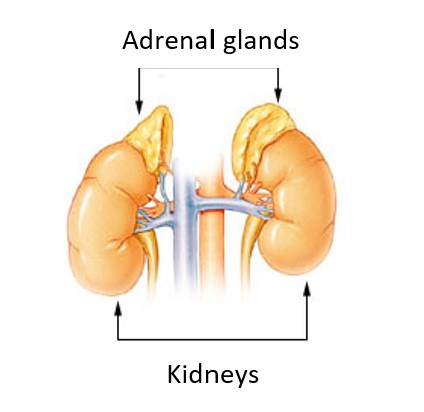
Do you find yourself more tired than you should be? Is your sleep interrupted? Are you easily overwhelmed? Has your motivation left the station? If you can answer yes to most of these questions, you may be suffering from tired out adrenals. Enter adrenal burnout.
What is Adrenal Burnout?
Adrenal burnout occurs when the adrenals are strained either by stress (emotional stress, physical stress, lack of sleep, poor diet, hormone imbalance, or any combination of these) or illness. Your adrenals, small glands located on top of each kidney, produce a number of life-giving hormones including cortisol, adrenaline, epinephrine, norepinephrine and DHEA. When these hormones get out of balance, you will start to notice adrenal burnout symptoms.

Symptoms
While adrenal burnout symptoms and their severity may vary from person to person, here are some of the more common symptoms:
Loss of motivation – Hormone imbalance saps energy quickly and it is difficult to be motivated when your energy levels tank. Your car can’t run on an empty tank, right? Well, you can’t “run” well on an empty tank, either. Getting enough rest and eating nutrient-dense foods is your first step in climbing up out of the adrenal burnout hole. If your energy is low, your motivation will follow suit. Don’t beat yourself up—you’re not being lazy. You are going through a temporary rough patch that you can bounce back from, if you take the right steps.
Dizziness or head-rush when standing — Adrenal stress can cause low cortisol levels. Cortisol governs blood pressure. If you are having adrenal struggles, you may also have low blood pressure, which can cause dizziness or lightheadedness.
Brain Fog – Tired adrenals also come with brain fog. Inadequate levels of cortisol will affect your central nervous system which, in turn, causes brain fog. Over time and with rest and the right nutrition, you will find yourself sharp as a tack once again! So, don’t lose hope. To help combat brain fog, you can supplement with fish oil for the omega three fatty acids.
Salt Cravings – Stressed adrenals can deplete some of your body’s minerals and leave you craving salt. An imbalance of adrenal hormones can cause your body to release needed minerals in the urine so you are left low on essential minerals. This may result in dehydration. It’s important to drink enough water when you are healing your adrenals. And you also may want to consider adding a mineral supplement to replenish what’s lost.
Increased Allergies and Asthma – Adrenal hormone imbalance also can result in new or worsening allergies. Theses allergies often show up as respiratory allergies or skin issues. f you have asthma, you may find that it becomes worse if your adrenals are taxed. The good news is that this will improve as your adrenals improve.
A Quick Temper – Burned out adrenals and the hormone imbalance that comes with them can leave you a little light in the patience department. You may become agitated more easily than when you are well. If possible, try to steer clear of high-tension situations while you’re healing. Letting yourself get too stressed out can prolong the healing process or even set you back.
Anxiety and/or Panic – The symptoms that can come with adrenal stress can be frightening. Especially if you don’t know the cause and how to fix it. But, also, hormone imbalance, in and of itself, can cause anxiety and panic attacks.
Sleep Trouble – Finally, we would be missing the mark if we didn’t include sleep. If your adrenals are stressed, you may have trouble getting to sleep or staying asleep. This, again, is due to the hormone imbalance and the body being stuck in fight or flight mode. Often, people with adrenal issues describe it as being “tired but wired”. They experience intense physical fatigue but their minds don’t always want to cooperate and be calm, especially when it’s time to sleep. Also, because of the typical cycling of cortisol being disrupted, somebody with stressed adrenals is likely to be more awake later in the day. They may even be a “night owl”.
Adaptogens for Treatment
Adaptogens are supplements that work by helping to normalize and regulate organ and system functions within the body. They primarily affect the hypothalamic-pituitary adrenal (HPA) axis and the nervous system. What this means to you is that they help to modulate our stress response (environment, emotional, or physical) and help regulate the immune, endocrine, and nervous systems.
Ashwagandha
Ashwagandha is a well-researched herbal extract. It may help to support a normal stress response by promoting healthy cortisol balance. Studies, including a 2008 randomized, double-blind, placebo-controlled human trial, show that ashwagandha may help to decrease biochemical and subjective indicators of stress and anxiety without side effects. It has been shown to have a positive impact on strength, sleep, immune support, anxiety, depression, and muscle and joint pain.(4)
Panax Ginseng
Panax ginseng has a reputation for packing a good energy punch. It also enhances physical endurance and supports healthy hormone balance. Helping the body to remain cool as a cucumber while under stress is another reason to consider ginseng. It supports healthy metabolic function and fat burning while under stress. (You may have already noticed that stress can lead to weight gain.) Some of the other benefits of ginseng are that it improves fatigue, enhances immunity, supports brain function, reduces muscle weakness, and it improves blood sugar. (7)
Eleuthero
Formerly known as Siberian ginseng, eleuthero was one of the first adaptogenic herbs studied in the Soviet Union. Russian athletes use it to enhance performance and speed recovery from injury. It also supports the body by improving blood sugar, focus, mental clarity, reducing joint and muscle pain, blood pressure, and jet lag. All of the symptoms just mentioned can be part of adrenal burnout. (5)
Licorice
There is some debate about whether or not licorice is actually an adaptogen. But it does have positive effects on adrenal burnout symptoms, so it is definitely worthy of being included here. For example, it has been found to help regulate cortisol and to boost energy. It also soothes inflammation in the GI tract which is one of the many factors that the body interprets as stress. And stress, as we know, is a huge contributing factor in many illnesses. (6)
If you think you are suffering from adrenal burnout, there are many simple changes you can make to lower your stress load to facilitate healing. Pair that with a few well-chosen supplements, and you should be on the road to healing in no time.
Sources:
- https://www.nichd.nih.gov/health/topics/adrenalgland/conditioninfo
- https://medlineplus.gov/adrenalglanddisorders.html
- https://www.endocrineweb.com/conditions/adrenal-disorders/adrenal-fatigue
- https://www.researchgate.net/publication/242151370_A_Standardized_Withania_Somnifera_Extract_Significantly_Reduces_Stress-Related_Parameters_in_Chronically_Stressed_Humans_A_Double-Blind_Randomized_Placebo-Controlled_Study
- https://pubmed.ncbi.nlm.nih.gov/21793317/
- https://www.ncbi.nlm.nih.gov/pmc/articles/PMC2276918/
- Mills S, Bone K. Principles and Practice of Phytotheraphy.2000: 418-30
The information provided here is for educational purposes only. None of the research or evidence presented here is intended as a substitute for consulting an appropriate healthcare professional. These statements have not been evaluated by the Food and Drug Administration. The products offered here are not intended to diagnose, treat, cure, or prevent any disease. If you believe that you may have a disease condition, please consult your healthcare practitioner before using this or any other dietary supplement.
